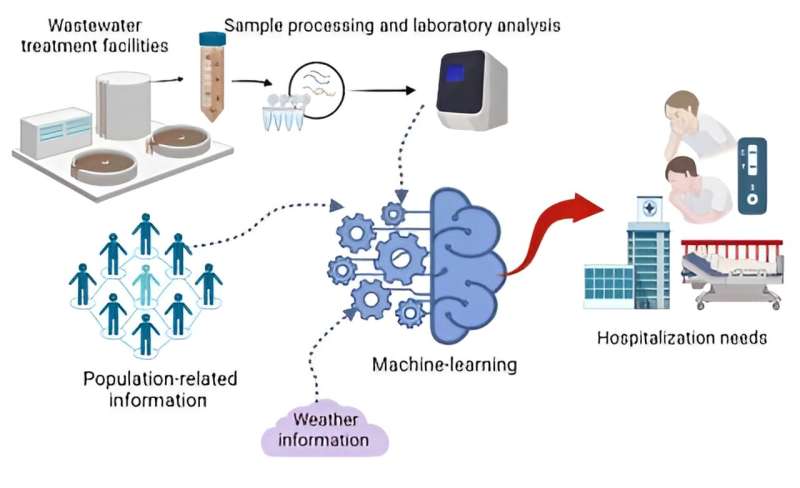This article has been reviewed according to Science X's editorial process and policies. Editors have highlighted the following attributes while ensuring the content's credibility:
fact-checked
peer-reviewed publication
trusted source
proofread
AI-based wastewater sampling predicts COVID hospital admissions

Researchers have developed an accurate prediction tool for estimating COVID-19 hospital admissions, using an AI–based system with wastewater sampling.
It is possible to accurately predict hospital admission numbers due to COVID-19 up to four weeks in advance using an AI–based system together with COVID wastewater sampling, new research shows.
The study, published in the journal Nature Communications, used wastewater data from 159 counties in the U.S., covering nearly 100 million Americans, along with U.S. hospital admission records, to develop the prediction model.
The research was led by Professor Qilin Wang and Dr. Xuan Li from the University of Technology Sydney together with researchers from UNSW Sydney, Delft University of Technology and Morgan State University.
"COVID-19 still poses a heavy burden on health care systems around the world. The number of Australians in hospital with COVID-19 peaked at around 5,500 and continues to fluctuate. Rapid increases in patient numbers can stress frontline health care capacity and increase fatality rates," Dr. Li said.
"Current prediction methods are based on COVID-19 laboratory testing, or self-testing and reporting, however this does not pick up asymptomatic cases, and many countries are moving away from rigorous testing requirements," she said.
Professor Wang said the research shows wastewater surveillance combined with AI–based modeling can be a cost-effective early warning system, allowing public health officials to better prepare for and manage pandemic waves, and efficiently allocate limited health care resources.
"Wastewater monitoring is already conducted in many countries, but it is limited to showing whether COVID-19 is present in a region, as well as a rough estimation of whether the burden is increasing or decreasing.
"We used artificial intelligence to pick up patterns and changes in the data and learn from this to increase the accuracy of predictions.
"Variables that can influence hospital admissions include changing behavior due to public policies, vaccination rates, holidays and weather. The established model can help accurately predict the hospitalization needs due to COVID-19 in the region," he said.
Dr. Li hopes to extend her research to include other infectious diseases that can be detected through wastewater-based epidemiology, including food-borne pathogens, such as salmonella and E-coli, and viruses such as flu, norovirus and hepatitis A.
"My Ph.D. focused on sewer design to reduce concrete corrosion, however I graduated right around the time of COVID-19 and saw an opportunity to monitor and study the pandemic," said Dr. Li.
"I'm grateful for the opportunity to receive the WH Gladstones award, particularly as an early career researcher, to explore the potential to create early-warning systems for COVID-19 and other diseases. I hope this work can benefit the community and inspire other women in science."
More information: Xuan Li et al, Wastewater-based epidemiology predicts COVID-19-induced weekly new hospital admissions in over 150 USA counties, Nature Communications (2023). DOI: 10.1038/s41467-023-40305-x


















